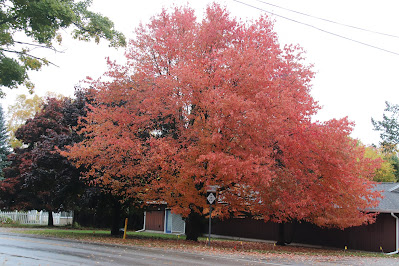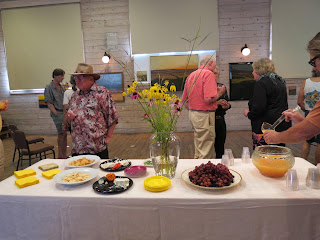 |
| How many leaves remain on this tree today? |
We are slip-sliding into winter. Is that an excuse for my lack of focus? In my last post I used a French phrase, sous un ciel couvert, which means under a cloudy sky. Not actual rain but “menacing,” or (I would say) threatening rain. Here is another French word, one that moves easily and frequently from skies to moods: maussade, which means gloomy, dreary, dismal.
 |
| A customer from France brought me this little souvenir! |
I love French words the way so many of us also love music. It makes me happy to hear them, to speak the language (to the best of my abilities), to read and write the words. In an often cold, hard world, it is one of my little comforts, a small joy. Malheureusement (unhappily), we have been in greater-than-usual need of comforts if we’re paying attention to world news, but to imagine how comfortless their world must be for those in the midst of war is heartbreaking and goes far beyond first-world self-care.
I’m ditching most of what I had composed for today as a draft in the past week. The first frost in my garden feels like old as well as trivial news, along with that green tomato chutney project. Also, I’d written about a forecast for snow “in the coming week,” but now that forecast is only scant hours away. And other parts of the country have the same, so it’s hardly a headline story.
For no other reason than because it’s somewhat cheery, I’ll insert here a couple pictures of my latest kitchen production. It’s applesauce with pears cooked along with the apples and a homemade drizzle of black raspberry syrup added for color.…
 |
| I like it chunky. |
And now I’ll use that food theme to segue to books and at the same circle back to the French. A friend tells me she doesn’t mind being alone but does mind eating alone. I told her I always have a dinner book nearby. The book that has seen me through many dinners lately, a few pages per meal, is Fernand Braudel’s L’Identité de la France.
On our side of the Atlantic, in a country stretching from ocean to ocean, we tend to think of France as medium-sized and unproblematically unified, but Braudel tells a different story. For reasons entirely different from those pertaining to the United States, as he sees it France is almost two different nations, north and south, with an intermediate buffer zone separating the two, and even that is an oversimplification. Histories, languages, soils, customs – la belle France is one nation politically in the larger world, but its peoples are diverse even from one village to the next.
But stop and think. Isn’t that the reality of human life everywhere? We may live under one law, but we inhabit multiple different and distinct smaller worlds. An Ethiopian friend of mine was astonished at how strong regional loyalties were in the United States, e.g., my ties to Michigan, she having expected we would all identify simply as Americans. My friend and I were in graduate school together for two years in Cincinnati (before I transferred to the University of Illinois), and in that unique river city – neither purely northern or southern, eastern or western -- each neighborhood had not only its own name (Clifton, Hyde Park, Over-the-Rhine, etc.) but also its own complete shopping district, so that the neighborhoods were like villages clustered to form the larger city but retaining their village identity.
Similarly, in Leelanau County, still largely rural, every village (incorporated or not) and every informal lake community has, if not always its own grocery store or library, certainly its own history and traditions. Northport and Leland schools resist consolidation – that is, Northport resists being incorporated into Leland schools – because of Comet vs. Wildcat pride. Empire and Northport are worlds apart! I only get south to Empire maybe once a year and always feel, when I do, that I’m very far from home.
Now let me express my increasing crankiness about the term “community” that’s being thrown around so continuously and haphazardly in ways inappropriate to my ear and sensibilities. The word has become ubiquitous, with people (on the news, at least) now speaking of the “world community,” as in, “What has been the response of the ‘world community’ to the crisis in [fill in the blank]?” As if there could possibly ever be a unitary response across all the nations and peoples of the world unless we were invaded from outer space! A local union of musicians or plumbers or autoworkers or screenwriters may put out an official statement, but how long did it take to hammer out something on which all members could agree even in such a limited case?
Okay, back to my sheep. My Ethiopian friend was proud of the fact that her country had never been a European colony, but she acknowledged that it had been “colonized from within” by the Amhara group, who dominated politics under the country’s period of monarchy. One could say of France, also, I suppose, that it was “colonized from within” by the powers of the Île de France region, as it was their language that eventually became the official national tongue, edging out Latin (brought by the Romans), Basque, Provencal, Occitan, etc., etc. Free, mandatory, secular education instituted in 1882 prohibited regional languages in French public schools after, as I understand it, the Franco-Prussian war (1870-71) convinced the government that in times of war, soldiers needed to understand each other and their commanders. A young generation growing up across the country with one language was also ripe for the subsequent age of empire – wars and annexations and conquests around the world – but that’s another story. Colonialism within preparing the way for colonies overseas?
Years ago, when we lived in Leland and started our mornings with coffee at the Early Bird, the Artist and I sometimes had conversations with an older man who had been – or his father had been; I forget which – superintendent of county schools here. It was he who made the decision, finally, that all public instruction should be in English. Before that, various small country Leelanau schools conducted classes in the dominant language of that area’s immigrants. Note: As for Catholic schools in Leelanau County, St. Mary’s School in Lake Leelanau had classes in English, but Holy Rosary for a long time had Polish nuns teaching Polish-American farm children in the Polish language. Then there is the history, now well known, of Native American children in boarding schools being forbidden to use their native languages, which was the case for many Ojibwa and Odawa from Leelanau.
And now, all over at least the Western world, the Odawa, the Irish, the Welsh, etc. are reclaiming the language lost by the generation before them.
Curious, I looked up sites discussing the Tower of Babel and found this one interesting, but the idea of verticality led me to think of homo sapiens beginning to walk upright, and then I questioned the writer’s conclusion that humans seek verticality to escape the earth’s surface. Did early bipedal humans want to escape the earth’s surface or simply be more at home on the ground than in the trees?
 |
| My friend Laura calls this the coming-home tree. |
I have no conclusions today, only questions and sadness, because what more can we ask other than to feel at home on the earth, wherever we are? But being driven from home, cut off from the place of memories, or having that place invaded and stolen – sadly, this is a major theme in human history. Une idée maussade, vraiment. Truly a dismal idea – but accurate, isn’t it?
If only humans could see difference among our species as enriching rather than threatening --
 |
| Le monde est un souk énorme! |
My plan for my next post is happier and more book-focused. Although the year is not yet at an end, I am too impatient to wait: I want to share with you a few novels I read this year for the first time (not necessarily newly published, in every case, but I’m not including those I re-read) and highly recommend without reservation. Maybe you will want to think about your top fiction picks for the year so far, too. I’d like that.
Happy Halloween (if that's your thing)!
 |
| New Bohemian Cafe folks do holidays well. (They do everything well.) |





















